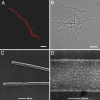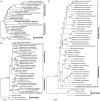A korarchaeal genome reveals insights into the evolution of the Archaea
- PMID: 18535141
- PMCID: PMC2430366
- DOI: 10.1073/pnas.0801980105
A korarchaeal genome reveals insights into the evolution of the Archaea
Abstract
The candidate division Korarchaeota comprises a group of uncultivated microorganisms that, by their small subunit rRNA phylogeny, may have diverged early from the major archaeal phyla Crenarchaeota and Euryarchaeota. Here, we report the initial characterization of a member of the Korarchaeota with the proposed name, "Candidatus Korarchaeum cryptofilum," which exhibits an ultrathin filamentous morphology. To investigate possible ancestral relationships between deep-branching Korarchaeota and other phyla, we used whole-genome shotgun sequencing to construct a complete composite korarchaeal genome from enriched cells. The genome was assembled into a single contig 1.59 Mb in length with a G + C content of 49%. Of the 1,617 predicted protein-coding genes, 1,382 (85%) could be assigned to a revised set of archaeal Clusters of Orthologous Groups (COGs). The predicted gene functions suggest that the organism relies on a simple mode of peptide fermentation for carbon and energy and lacks the ability to synthesize de novo purines, CoA, and several other cofactors. Phylogenetic analyses based on conserved single genes and concatenated protein sequences positioned the korarchaeote as a deep archaeal lineage with an apparent affinity to the Crenarchaeota. However, the predicted gene content revealed that several conserved cellular systems, such as cell division, DNA replication, and tRNA maturation, resemble the counterparts in the Euryarchaeota. In light of the known composition of archaeal genomes, the Korarchaeota might have retained a set of cellular features that represents the ancestral archaeal form.
Conflict of interest statement
The authors declare no conflict of interest.
Figures


Comment in
-
A Korarchaeote yields to genome sequencing.Proc Natl Acad Sci U S A. 2008 Jul 1;105(26):8805-6. doi: 10.1073/pnas.0804670105. Epub 2008 Jun 24. Proc Natl Acad Sci U S A. 2008. PMID: 18577584 Free PMC article. No abstract available.
References
Publication types
MeSH terms
LinkOut - more resources
Full Text Sources
Other Literature Sources
Molecular Biology Databases
Miscellaneous

